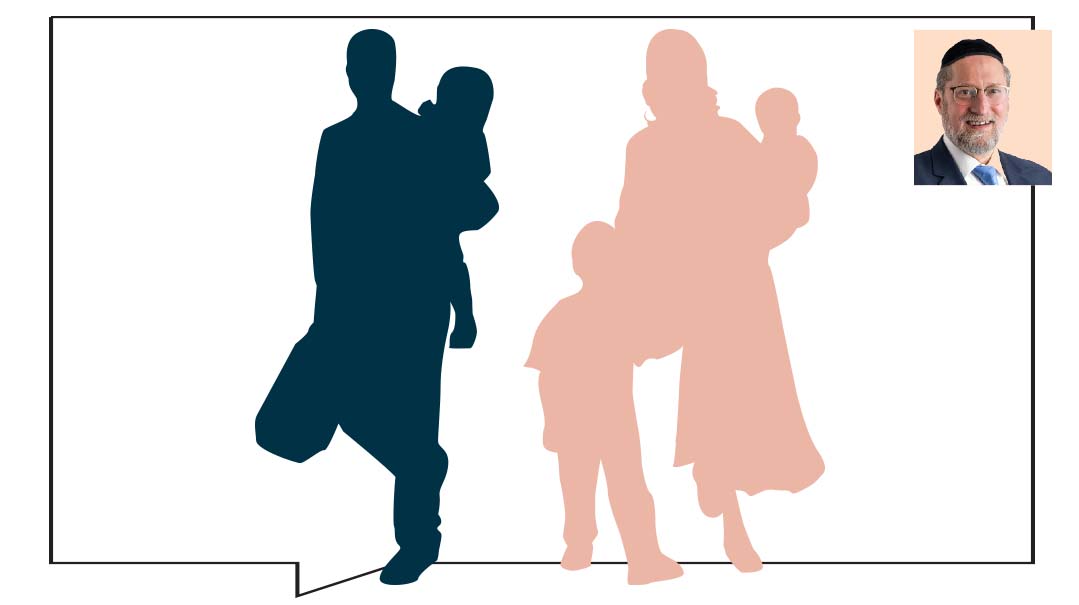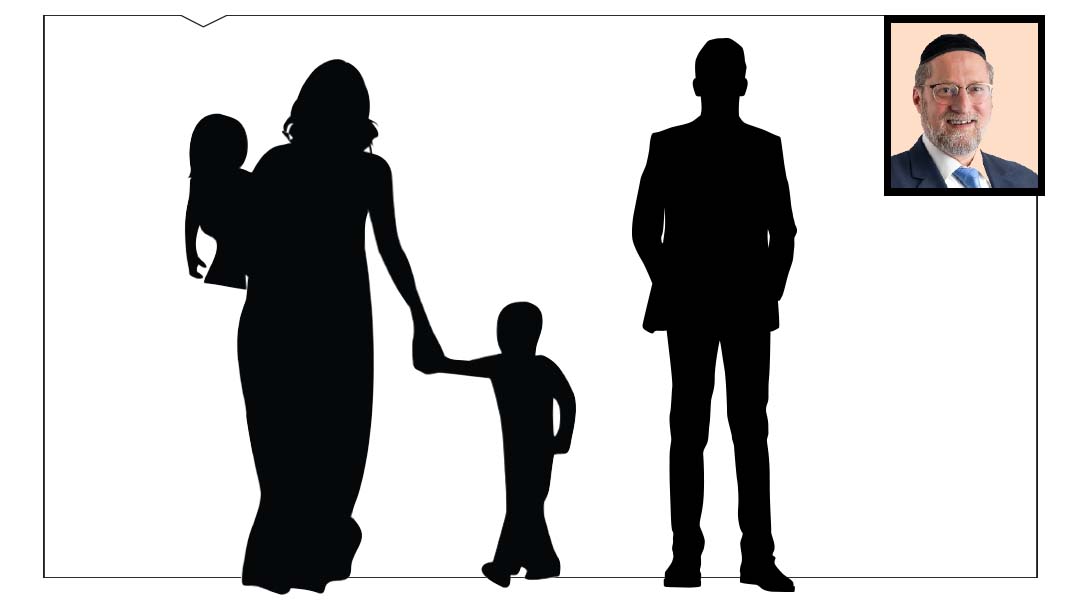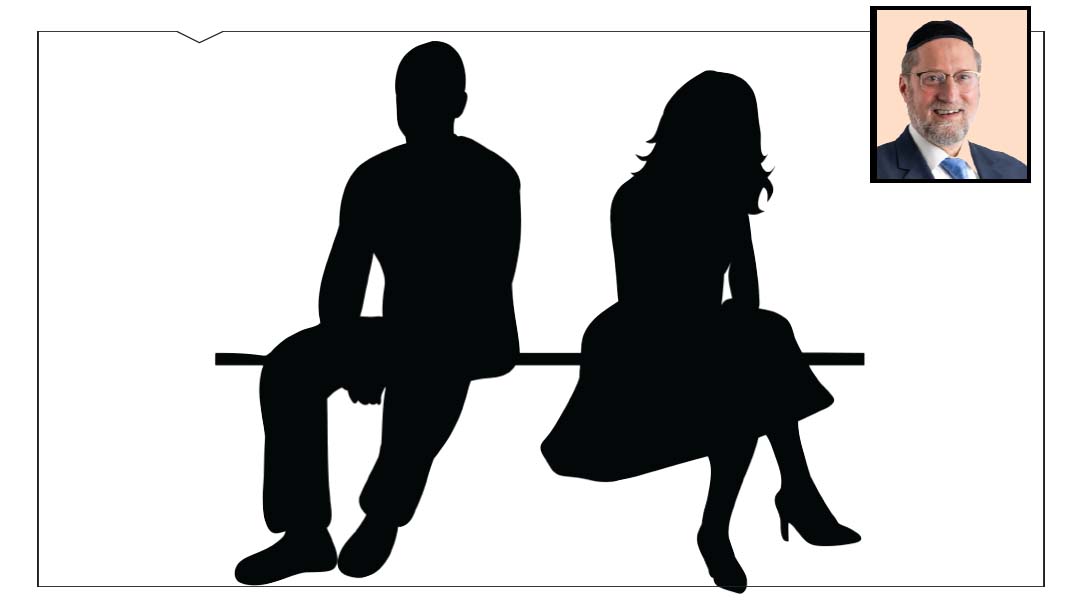“Why Doesn’t He Take the Initiative to Help Me?”
| November 9, 2021You can be right or you can be happily married — not both

Written with Zivia Reischer
Rabbi Shafier,
My husband is a good person and I try to be a good wife. I know no one is perfect and that in marriage you need to overlook a lot of things. I try to focus on my husband’s strengths (and baruch Hashem there are many) and not to focus on what he does wrong. But sometimes it gets to be too much and I just snap.
For example, this year the Yom Tov calendar was very challenging. It seemed like every other day was Erev Shabbos or Erev Yom Tov, the kids never seemed to have school, but of course we both had to work regardless. I was cooking nonstop for a month — plus all the shopping, cleaning, and laundry that making Yom Tov entails. Meanwhile my husband would come home from work and plant himself on the couch while I’d be frantically trying to cook and the kids would be demolishing the house around me. I’d be trying to make supper and make Yom Tov and keep everything going and he’d literally just sit there — or maybe if it was really noisy, he’d go into his study and shut the door! As if the kids weren’t climbing the bookshelves or dumping out all the toys or pulling on me and crying while I was trying to get everything done. Eventually I just lost it and screamed at him to get off the couch and help me.
He did get up and help, but he was quiet and distant for a few days afterward. I know I’m not supposed to yell like that, but I don’t get him. Why does he just sit around and watch me struggle? Why doesn’t he take the initiative and get involved and help? I get that he feels hurt when I talk to him like that, but I don’t know how to change this dynamic.
You’re a hundred percent right that he should take responsibility and help you. But you can be right or you can be happily married — not both.
In order to understand what’s happening here, let’s try to climb into his mind and listen to his inner dialogue.
I assume that, as you say, he’s a good person. He comes home after a long day and he’s wiped. He figures it’s okay if he takes a few moments to just breathe. He knows the kids are out of control, but he’s thinking, “Hey, just give me a couple of minutes.”
The next thing he knows you’re yelling at him: “Can you get off the couch already?! Either make dinner or take care of the kids but don’t just sit there!”
And he does get off the couch and help. But while he does, your words are playing over and over in his mind. No matter how “right” you are (and no matter how much he knows it), if you’re going to speak to your husband like that, it’s going to be hard for him to feel warmly toward you. This is an unfortunate mistake that many married couples make: They forget that they are best friends. Instead, they act like a boss, or even a drill sergeant. They forget their role in the relationship. They could be the nicest, most thoughtful people, but in the context of their marriage they become bossy, domineering, or even downright nasty. And it’s not just “not nice” — it actually violates the terms of your marriage.
Under the chuppah, we bless the chassan and kallah that they should be “rei’im ahuvim.” Rashi explains that this means the couple should be friends who love each other. That is the relationship. That is the role you agreed to play. When you yell at him, when you order him around, you step out of the role you agreed to play. You might be right that he should help you, but when you act as anything other than a friend, you damage the relationship. You might get the help you need in the moment, but your marriage will suffer. You need to express your needs in a way that doesn’t damage the relationship. You need to express your needs the way friends talk to each other.
If you can do that, you will change the dynamic — and instead of finding yourself distant from your husband, you will find that he is your best friend.
A marriage is a union of friendship and love between two unique individuals, each with their own strengths, weaknesses, and idiosyncrasies, and each with their own needs, desires, and wishes.
The problem is that often his needs and her needs compete with each other, and there are limited resources. There’s only so much money we have to spend, there’s only so much time in the day, there are only so many things we have energy to do, and we certainly can’t be in two places at once.
Learning to navigate the multitude of choices that must be made to meld two lives together and still remain friends takes a lot of work.
So who decides which choice to make? Who wields the power? Who’s the boss?
If your marriage is healthy, the answer is, no one. No one is the boss. You are partners — friends. No one is in charge. No one has carte blanche. No one has veto power. No one has the right to say, “My way or the highway!” That works in a dictatorship, not in a marriage.
You may decide to delegate an area of responsibility to one spouse (for instance, it sounds like cooking is this woman’s job), but that’s a joint decision. Together, you decide on a division of labor. You both agree to let one spouse take the lead in that area. Nevertheless, you are equal partners. You are friends. And the first rule of friendship is that friends don’t boss friends around.
The second rule of friendship is that friends have fun together.
You have to have fun in your marriage. You have to be friends, have a fun attitude, and do things you enjoy together. Fun isn’t frivolous. Fun isn’t optional. It’s vital to the success of marriage — to success in life.
The third rule of friendship is that friends support each other. They support each other in public and they support each other in the privacy of their home.
What does support mean? Support means you are deaf, dumb, and blind to the things your spouse does wrong. If your spouse messes up, you don’t notice it. Sharing critique for the sake of helping your spouse see the light is a formula for misery.
If your friends say your spouse is wrong, it’s you and your spouse against your friends. If your family says your spouse is wrong, it’s you and your spouse against your family. If the world says your spouse is wrong, it’s you and your spouse against the world (assuming we aren’t dealing with something dangerous or abusive, in which case you need to bring the issue to a rav or skilled marriage counselor).
Which brings us to the fourth rule of friendship: Friends are tolerant and forgiving.
If your wife messed up and bounced a check again, you may believe you have every right to demand that she stop doing it. But a successful marriage isn’t about rights and demands. It’s about friends working together through the issues of life.
As an adolescent, you had to learn to make peace with who you were and accept that your flaws weren’t a source of shame. Your flaws are your challenges, your areas of growth, but they don’t make you defective or unworthy. Hashem created you with these flaws and gave you a lot to accomplish. You are a work in progress.
Just as you learned to accept and tolerate yourself, you have to apply the same acceptance and tolerance toward your spouse. The minute you decide that there is something in your spouse you can’t accept — I can’t deal with his laziness, I hate how she can’t keep this house together — you’re no longer acting like a friend. You’re stepping outside the commitment of your marriage. (And you’re not being fair; I’m sure you don’t hold yourself to that standard of perfection.)
It’s fine to sit down with your spouse and explain that you feel abandoned when he doesn’t help out, or that you can’t function well when the house is a mess. But the minute you become intolerant, you’ve stopped being a friend, and you’re not honoring the commitment you made under the chuppah. Friends who love each other learn to be tolerant, forgiving, and look the other way.
Every marriage has issues, but friends who love each other negotiate as friends and don’t try to boss each other around. You have fun together and keep the atmosphere light, and you learn to laugh. Because you’re friends, you are supportive toward your spouse, even if you think she was wrong. When your spouse does something that hurts you, you’re able to forgive, because friends are tolerant and forgiving. That’s the dynamic you are aiming for: to be rei’im ahuvim, best friends who love each other.
(Originally featured in Mishpacha, Issue 885)
Oops! We could not locate your form.







